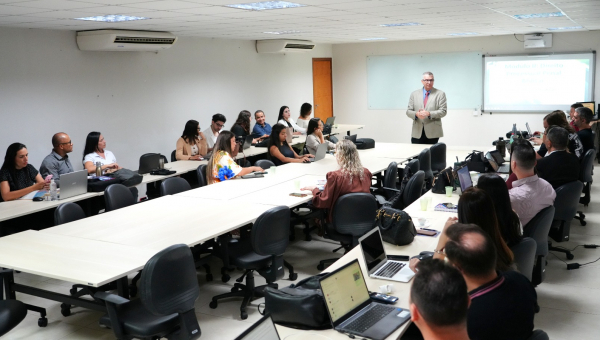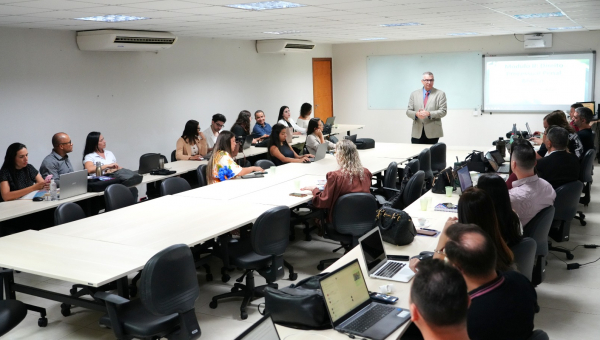
Magistrates and civil servers of the Judiciary of the state of Tocantins concluded, on Friday (October 3rd), the course on Preparation of Sentences in Military Criminal Proceedings and Civil Cases of Competence of the Military Justice. The training, carried out by the Superior School of the Judges of the State of Tocantins (Esmat), had a workload of 32 class hours and it was conducted by Professors Cícero Robson Coimbra Neves and Reinaldo Zichar de Moraes.
The course aimed to deepen the technical-legal performance in the State Military Justice, criminal and civil spheres. The proposal, which began on September 30th, included theoretical presentations, case studies and practical activities that stimulated critical analysis of current jurisprudence and technical application of the rules of Criminal Law and Military Criminal Procedure. During the four days of immersion, the participants were able to talk to the professors about the main difficulties faced in acting in the Military Justice, especially regarding the preparation of minutes of sentences.
Under the coordination of Judge José Ribamar Mendes Júnior, the course was divided into three modules: Military Criminal Law, Military Criminal Procedural Law and Civil Jurisdiction of the State Military Courts. In his testimony, the magistrate highlighted the importance of training for strengthening Military Justice.
“The military criminal sentence is not only a judicial act; it represents the realization of the constitutional principles of legality, broad defense and due process within the military institutions. It requires technique, prudence and responsibility, because it directly impacts not only the freedom of the accused, but also discipline, hierarchy and the very credibility of the Armed Forces and the Military Police before society. In the context of the Judiciary of the state of Tocantins, the relevance of this issue is even more evident. We are called, on a daily basis, to balance the values of public order and institutional security with the protection of the fundamental rights of the jurisdictions. The training, therefore, strengthens the performance of magistrates and civil servers, ensuring greater legal certainty and quality in the judicial service", pointed out.
For Professor Reinaldo Zichar de Moraes, who led the modules of Military Criminal Procedural Law and civil competence of the Military Justice, the course played an essential role in building solid and shared technical understandings on the subject.
"Teaching this course was an extremely pleasant experience. I would like to highlight the excellent structure and the welcome that Professor Cícero and I received, as well as the undeniable quality of the students, who were always very participative, with contributions of high relevance. I must also highlight the fundamental importance of the discussion of the course topics, because Military Law has numerous particularities that need to be known by diverse professionals who act in the State Judiciary, given its competence to act in many military criminal disputes and judicial actions arising from disciplinary sanctions. As it is a somewhat restricted subject, there is often some difficulty for the operators to discuss legal and factual situations that occur in everyday life and that can bring severe impacts to judicial processes", he argued.
Professor Cícero Robson Coimbra, who taught the module of Military Criminal Law, also stressed the relevance of the training: "It was an honor to participate in this beautiful initiative of Esmat, with a course aimed at pragmatic postulates of sentence preparation in Military Justice. Initiatives like this strengthen the Military Justice System, besides being an immense contribution to the training of the actors involved and to the exchange of ideas”.
The experience was also highlighted by the participants a rare opportunity for practical approximation with the routine of the State Military Justice. Gabrielle Vilanova, legal advisor in the in the District of Ponte Alta do Tocantins, reinforced the importance of an in-depth approach for a safer operation.
"The course was very useful, bringing more clarity on the drafting of sentences in military criminal proceedings and in the processes of competence of the Military Justice. The opportunity to deepen knowledge on specific topics, which often do not integrate everyday life, but require technical preparation and legal certainty, strengthens the performance of the Judiciary and contributes to more informed decisions and aligned with the reality of the Military Justice", he said.
In the same line, Aline Alves Ribeiro, legal advisor in the District of Miracema do Tocantins, highlighted the technical gains and the comparison between the common and military penal systems.
“The clear and in-depth presentation of the program content, combined with the study of concrete cases, provided us participants with a solid understanding of the application of law in the Military Justice, both in the criminal and civil spheres. This is an essential training for the technical improvement and more confident and informed performance of advisors and magistrates who work in this field," she commented.




_thumbnail_thumbnail.jpeg)
_thumbnail_thumbnail.jpeg)
_thumbnail_thumbnail.jpeg)

_thumbnail.jpeg)
_thumbnail.jpeg)
_thumbnail.jpeg)

